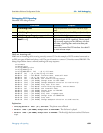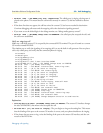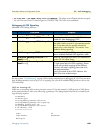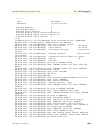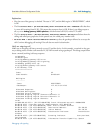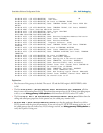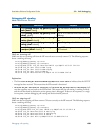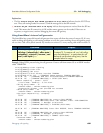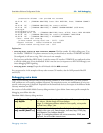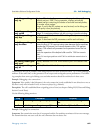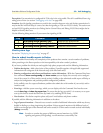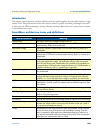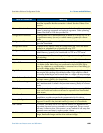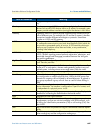
Debugging voice data 640
SmartWare Software Configuration Guide 52 • VoIP debugging
presentation allowed - user provided not screened
19:17:44 ICC > [TERMINAL-00df2760] State: CALL RECEIVED, Event: TERMINAL CONNECT
IND
19:17:44 ICC > [TERMINAL-00df2760] Set state to ACTIVE
19:17:44 ICC > [TERMINAL-00df2760] >> CONNECT ACKNOWLEDGEMENT (DSS1 Ntwk)
unit(cfg)#
unit(cfg)#call 55 drop
unit(cfg)#19:19:29 ICC > [TERMINAL-00df2760] State: ACTIVE, Event: PEER RELEASED
19:19:29 ICC > [TERMINAL-00df2760] Set state to DISCONNECT INDICATION
19:19:29 ICC > [TERMINAL-00df2760] >> DISCONNECT (DSS1 Ntwk)
Cause : normal call clearing
private network serving local user - CCITT - Q.931
Progress indicator : inband information available
private network serving local user - CCIT
Explanation:
•
unit(cfg)#call 55 dial 50 dest-interface TERMINAL: Dial the number 50, which calling-party 55 to
the interface TERMINAL. If a phone connected to the port that binds to interface TERMINAL has MSN
50 configured, it will start to ring. This is the case in our example.
• You just have verified that ISDN layer1–3 and the context CS interface TERMINAL are configured so that
a call with called-party 50 can be handled. If this is not the case (no response or a RELEASE message), con-
tinue debugging ISDN signaling.
•
unit(cfg)#call 55 drop: Drops the call initiated with the dial command.
You can proceed as in this example with any other context CS interface, also for VoIP protocols like SIP
and H.323.
Debugging voice data
There are several debug monitors that can help identify problems in VoIP connections. The most common
VoIP problems are: voice quality problems (dropouts), fax transmission errors, no establishment of voice con-
nection, and wrong tone or playback. Dependent on the SmartNode devices, the output of the different Media
Gateway monitors can differ.
An overview of all available Media Gateway debug monitors is given below. Some more specific examples for
debugging cases follow after that.
Overview: Media Gateway debug monitors
[no] debug media-gate-
way dejitter
Displays changes to the settings of the dejitter buffer, exceptions (under-
run, overrun, packet drops) and size changes.
Usage: To investigate problems related to voice quality, voice packet
payload sizes, delays, jitter
[no] debug media-gate-
way control [detail level]
Displays control activities on the Data Path (path of voice/fax data
packets within your unit): State changes, tone start/stop, DTMF play-
back/detection, fax/modem detection.
Usage: To investigate problems with voice connections, DTMF, tone
playback, fax and modem transmissions.



